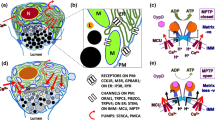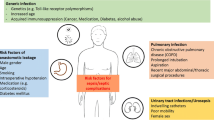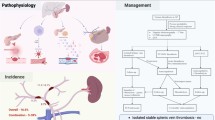Abstract
Severe acute pancreatitis (SAP) develops in about 25% of patients with acute pancreatitis. Severity of acute pancreatitis is linked to the presence of systemic organ dysfunctions and/or necrotizing pancreatitis. Risk factors independently determining the outcome of SAP are early multiorgan failure (MOF), infection of necrosis, and extended necrosis (>50%). Morbidity of SAP is biphasic, in the first week it is strongly related to systemic inflammatory response syndrome while, sepsis due to infected pancreatic necrosis leading to MOF syndrome occurs in the later course after the first week. Contrast-enhanced computed tomography provides the highest diagnostic accuracy for necrotizing pancreatitis when performed after the first week of disease. Patients who suffer early organ dysfunctions or are at risk for developing a severe disease require early intensive care treatment. Antibiotic prophylaxis has not been shown as an effective preventive treatment. Early enteral feeding is based on a high level of evidence, resulting in a reduction of local and systemic infection. Patients suffering infected necrosis causing clinical sepsis are candidates for intervention. Hospital mortality of SAP after interventional or surgical debridement has decreased to below 20% in high-volume centers.


Similar content being viewed by others
References
Folch-Puy E (2007) Importance of the liver in systemic complications associated with acute pancreatitis: the role of kuffer cells. J Pathol 211:383–388
Bhatia M, Brady M, Shokuchi S, Christmas S, Neoptolemas JP, Slavin J (2000) Inflammatory mediators in acute pancreatitis. J Pathol 190:117–125
Beger HG, Rau B, Mayer J, Pralle U (1997) Natural course of acute pancreatitis. World J Surg 21:130–135
Buchler MW, Gloor B, Muller CA, Friess H, Seiler CA, Uhl W (2000) Acute necrotising pancreatitis: treatment strategy according to the status of infection. Ann Surg 232:619–626
Besselink MG, van Santvoort HC, Boermeester MA, Nieuwenhuijs VB, van Goor H et al (2009) Dutch Acute Pancreatitis Study Group. Timing and impact of infections in acute pancreatitis. Br J Surg 96:267–273
Acute Pancreatitis Classification Working Group (2008) Revision of the Atlanta Classification of Acute Pancreatitis. Available at http:www.pancreasclub.com/resources/Atlantaclassification.pdf. Volume 2009
Wu BU, Johannes RS, Sun X, Tabak Y, Conwell DL, Banks PA (2008) The early prediction of mortality in acute pancreatitis: a large population-based study. Gut 57:1698–1703
Working party of the British society of Gastroenetrology, Association of surgeons of Great Britain and Ireland, Pancreatic society of Great Britain and Ireland, association of Upper GI Surgeons of Great Britain and Ireland (2005) UK guidelines for the management of acute pancreatitis. Gut 54(Suppl 3):iii1–iii9
Balthazar EJ (2002) Acute pancreatitis: assessment of severity with clinical and CT evaluation. Radiology 223:603–613
Mortele KJ, Wiesner W, Intriere L, Shankar S, Zou KH, Kalantari BN et al (2004) A modified CT severity index for evaluating acute pancreatitis: improved correlation with patient outcome. AJR Am J Roentgenol 183:1261–1265
Pappas TN (2005) Computerized tomographic aspiration of infected pancreatic necrosis: the opinion against its routine use. Am J Gastroenterol 100:2373–2374
Dambrauskas Z, Gulbinas A, Pundzius J, Barauskas G (2007) Value of routine clinical tests kin predicting the development of infected pancreatic necrosis in severe acute pancreatitis. Scand J Gastroenterol 42:1256–1264
Uhl W, Warshaw A, Imrie C, Bassi C, McKay CJ, Lankisch PG, International Association of Pancreatology et al (2002) IAP guidelines for the surgical management of acute pancreatitis. Pancreatology 2:565–573
Banks PA, Freeman ML, Practice parameters committee of the American College of Gastroenterology (2006) Practice guidelines in acute pancreatitis. Am J Gastroenterol 101:2379–2400
Uhl W, Warshaw A, Imrie C, Bassi C, Mckay CJ, Lankisch PG, et al. International Association of Pancreatology. IAP Guidelines for the surgical management of acute pancreatitis. Pancreatology 2:565–573
Takeda K, Takada T, Kawarada Y, Hirata K, Mayumi T, Yoshida M et al (2006) JPN Guidelines for the management of acute pancreatitis: medical management of acute pancreatitis. J Hepatobiliary Pancreat Surg 13:42–47
Meier R, Ockenga J, Pertkiewicz M, Pap A, Milinic N, Macfie J, DGEM (German Society for Nutritional Medicine), Löser C, Keim V, ESPEN (European Society for Parenteral and Enteral Nutrition) (2006) ESPEN Guidelines on Enteral Nutrition: pancreas. Clin Nutr 25:275–284
Kochhar R, Ahammed SK, Chakrabarti A, Ray P, Sinha SK, Dutta U et al (2009) Prevalence and outcome of fungal infection in patients with severe acute pancreatitis. J Gastroenterol Hepatol 24:743–747
Isenmann R, Rünzi M, Kron M, Kahl S, Kraus D, Jung N et al (2004) Prophylactic antibiotic treatment in patients with predicted severe acute pancreatitis: a placebo-controlled, double-blind trial. Gastroenterology 126:997–1004
Dellinger EP, Tellado JM, Soto NE, Ashley SW, Barie PS et al (2007) Early antibiotic treatment for severe acute necrotizing pancreatitis: a randomized, double-blind, placebo-controlled study. Ann Surg 245:674–683
Villatoro E, Bassi C, Larvin M (2006) Antibiotic therapy for prophylaxis against infection of pancreatic necrosis in acute pancreatitis. Cochrane Database Syst Rev CD002941
Taylor E, Wong C (2004) The optimal timing of laparoscopic cholecystectomy in mild gallstone pancreatitis. Am Surg 70:971–975
Heinrich S, Schäfer M, Rousson V, Clavien PA (2006) Evidence based treatment of acute pancreatitis: a look at established paradigms. Ann Surg 243:154–168
Uhl W, Müller CA, Krähenbühl L, Schmid SW, Schölzel S, Büchler MW (1999) Acute gallstone pancreatitis: timing of laparoscopic cholecystectomy in mild and severe disease. Surg Endosc 13:1070–1076
Schachter P, Peleg T, Cohen O (2000) Interval laparoscopic cholecystectomy in the management of acute biliary pancreatitis. HPB Surg 11:319–322, discussion 322–323
Tate JJ, Lau WY, Li AK (1994) Laparoscopic cholecystectomy for biliary pancreatitis. Br J Surg 81:720–722
Schietroma M, Carlei F, Lezoche E, Rossi M, Liakos CH, Mattucci S et al (2001) Acute biliary pancreatitis: staging and management. Hepatogastroenterology 48:988–993
Oría A, Cimmino D, Ocampo C, Silva W, Kohan G, Zandalazini H et al (2007) Early endoscopic intervention versus early conservative management in patients with acute gallstone pancreatitis and biliopancreatic obstruction: a randomized clinical trial. Ann Surg 245:10–17
Fölsch UR, Nitsche R, Lüdtke R, Hilgers RA, Creutzfeldt W (1997) Early ERCP and papillotomy compared with conservative treatment for acute biliary pancreatitis. The German Study Group on Acute Biliary Pancreatitis. N Engl J Med 336:237–242
Neoptolemos JP, Carr-Locke DL, London NJ, Bailey IA, James D et al (1988) Controlled trial of urgent endoscopic retrograde cholangiopancreatography and endoscopic sphincterotomy versus conservative treatment for acute pancreatitis due to gallstones. Lancet 2:979–983
Sharma VK, Howden CW (1999) Meta-analysis of randomized controlled trials of endoscopic retrograde cholangiography and endoscopic sphincterotomy for the treatment of acute biliary pancreatitis. Am J Gastroenterol 94:3211–3214
Petrov MS, van Santvoort HC, Besselink MG, van der Heijden GJ, van Erpecum KJ, Gooszen HG (2008) Early endoscopic retrograde cholangiopancreatography versus conservative management in acute biliary pancreatitis without cholangitis: a meta-analysis of randomized trials. Ann Surg 247:250–257
Forsmark CE, Baillie J (2007) AGA Institute technical review on acute pancreatitis. Gastroenterology 132:2022–2044
De Waele JJ, Vogelaers D, Blot S, Colardyn F (2003) Fungal infections in patients with severe acute pancreatitis and the use of prophylactic therapy. Clin Infect Dis 37:208–221
Friedland S, Kaltenbach T, Sugimoto M, Soetikno R (2009) Endoscopic necrosectomy of organised pancreatic necrosis: a currently practised NOTES procedure. J Hepatobiliary Pancreat Surg 16:266–269
Baron TH, Thaggard WG, Morgan DE, Stanley RJ (1996) Endoscopic therapy for organised pancreatic necrosis. Gastroenterology 111:755–764
Seewald S, Groth S, Omar S, Imazu H, Seitz U, dee Weerth A et al (2005) Aggressive endoscopic therapy for pancreatic necrosis and pancreatic abscess: a new safe and effective treatment algorithm. Gastrointest Endosc 62:92–100
Baron TH, Morgan DE (1999) Endoscopic transgastric irrigation tube placement via PEG for debridement of organised pancreatic necrosis. Gastrointest Endosc 50:574–577
Ferrucci JT 3rd, Mueller PR (2003) Interventional approach to pancreatic fluid collections. Radiol Clin North Am 41:1217–1226
Connor S, Ghaneh P, Raraty M, Sutton R, Rosso E, Garvey CJ et al (2003) Minimally invasive retroperitoneal pancreatic necrosectomy. Dig Surg 20:270–277
Risse O, Auguste T, Delannoy P, Cardin N, Bricault I, Létoublon C (2004) Percutaneous video-assisted necrosectomy for infected pancreatic necrosis. Gastroenterol Clin Biol 28:868–871
Cheung MT, Ho CN, Siu KW, Kwok PC (2005) Percutaneous drainage and necrosectomy in the management of pancreatic necrosis. ANZ J Surg 75:204–207
Parekh D (2006) Laparoscopic assisted pancreatic necrosectomy: a new surgical option for treatment of severe necrotising pancreatitis. Arch Surg 141:895–902, discussion 902–903
Bucher P, Pugin F, Morel P (2008) Minimally invasive necrosectomy for infected necrotizing pancreatitis. Pancreas 36:113–319
Ruben Rodriguez J, Razo AO, Targarona J, Thayer SP, Rattner DW, Warshaw AL et al (2008) Debridement and closed packing for sterile or infected necrotizing pancreatitis. Ann Surg 247:294–299
Babu BI, Sheen AJ, Lee SH, O'Shea S, Eddleston JM, Siriwardena AK (2010) Open pancreatic necrosectomy in the multidisciplinary management of postinflammatory necrosis. Ann Surg 251:783–786
van Santvoort HC, Besselink MG, Bakker OJ, Hofker HS, Boermeester MA, Dejong CH et al (2010) A step-up approach or open necrosectomy for necrotizing pancreatitis. Dutch Pancreatitis Study Group. N Engl J Med 362:1491–1502
Connor S, Alexakis N, Raraty MG, Ghaneh P, Evans J, Hughes M et al (2005) Early and late complications after pancreatic necrosectomy. Surgery 137:499–505
Author information
Authors and Affiliations
Corresponding author
Rights and permissions
About this article
Cite this article
Doctor, N., Agarwal, P. & Gandhi, V. Management of Severe Acute Pancreatitis. Indian J Surg 74, 40–46 (2012). https://doi.org/10.1007/s12262-011-0384-5
Received:
Accepted:
Published:
Issue Date:
DOI: https://doi.org/10.1007/s12262-011-0384-5




